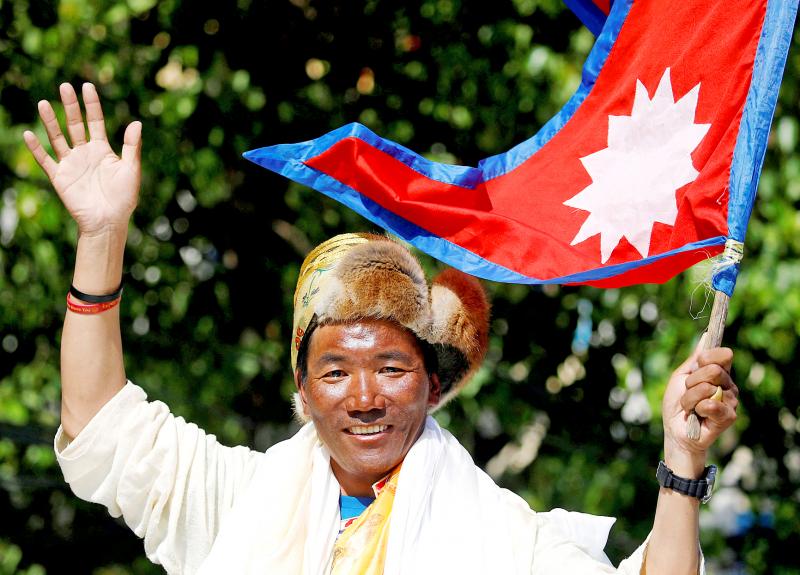An experienced Nepalese Sherpa guide scaled Mount Everest for the 26th time breaking his own record for the most climbs of the world’s highest peak, expedition organizers said yesterday.
Kami Rita reached the 8,849m summit on Saturday evening leading a group of Sherpa climbers who fixed ropes along the route so that hundreds of other climbers and guides can make their way to the top of the mountain later this month.
Rita and 10 other Sherpa guides reached the summit without any problems and had safely returned to lower camps, said Mingma Sherpa of the Kathmandu-based Seven Summit Treks.

Photo: Reuters
The group reached the summit at about 7pm on Saturday, which by Everest climbing standards is late. At night, there is risk of weather conditions deteriorating and climbers losing their way on the way down.
Sherpa said the guides were all highly experienced climbers.
There are hundreds of foreign climbers and an equal number of Sherpa guides who would attempt to climb Everest this month. May is the best month to climb Everest, as it has the best weather conditions. There are generally only a couple of windows for good weather on the highest section of the mountain in May that enable climbers to reach the summit.
Rita, 52, first scaled Everest in 1994 and has been making the trip nearly every year since then. He is one of many Sherpa guides whose expertise and skills are vital to the safety and success of the foreign climbers who head to Nepal each year.
In addition to his 26 times to the top of Everest, Rita has scaled several other peaks that are among the world’s highest, including K-2, Cho-Oyu, Manaslu and Lhotse.

BACKLASH: The National Party quit its decades-long partnership with the Liberal Party after their election loss to center-left Labor, which won a historic third term Australia’s National Party has split from its conservative coalition partner of more than 60 years, the Liberal Party, citing policy differences over renewable energy and after a resounding loss at a national election this month. “Its time to have a break,” Nationals leader David Littleproud told reporters yesterday. The split shows the pressure on Australia’s conservative parties after Prime Minister Anthony Albanese’s center-left Labor party won a historic second term in the May 3 election, powered by a voter backlash against US President Donald Trump’s policies. Under the long-standing partnership in state and federal politics, the Liberal and National coalition had shared power

CONTROVERSY: During the performance of Israel’s entrant Yuval Raphael’s song ‘New Day Will Rise,’ loud whistles were heard and two people tried to get on stage Austria’s JJ yesterday won the Eurovision Song Contest, with his operatic song Wasted Love triumphing at the world’s biggest live music television event. After votes from national juries around Europe and viewers from across the continent and beyond, JJ gave Austria its first victory since bearded drag performer Conchita Wurst’s 2014 triumph. After the nail-biting drama as the votes were revealed running into yesterday morning, Austria finished with 436 points, ahead of Israel — whose participation drew protests — on 357 and Estonia on 356. “Thank you to you, Europe, for making my dreams come true,” 24-year-old countertenor JJ, whose

NO EXCUSES: Marcos said his administration was acting on voters’ demands, but an academic said the move was emotionally motivated after a poor midterm showing Philippine President Ferdinand Marcos Jr yesterday sought the resignation of all his Cabinet secretaries, in a move seen as an attempt to reset the political agenda and assert his authority over the second half of his single six-year term. The order came after the president’s allies failed to win a majority of Senate seats contested in the 12 polls on Monday last week, leaving Marcos facing a divided political and legislative landscape that could thwart his attempts to have an ally succeed him in 2028. “He’s talking to the people, trying to salvage whatever political capital he has left. I think it’s

A documentary whose main subject, 25-year-old photojournalist Fatima Hassouna, was killed in an Israeli airstrike in Gaza weeks before it premiered at Cannes stunned viewers into silence at the festival on Thursday. As the cinema lights came back on, filmmaker Sepideh Farsi held up an image of the young Palestinian woman killed with younger siblings on April 16, and encouraged the audience to stand up and clap to pay tribute. “To kill a child, to kill a photographer is unacceptable,” Farsi said. “There are still children to save. It must be done fast,” the exiled Iranian filmmaker added. With Israel